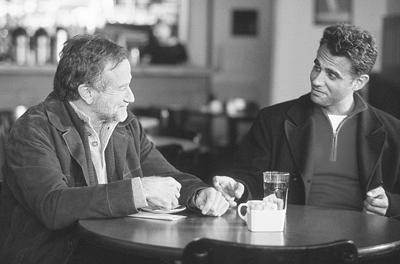Fraudulent identities haunt “The Night Listener”
Made into a film 14 years after the events that inspired Armistead Maupin’s source novel, “The Night Listener” remains topical. Thanks to the past year’s revelations about James Frey and JT Leroy’s fraudulent identities, it could hardly be otherwise. Indeed, some have speculated that Maupin’s novel inspired Laura Albert to create the persona of JT Leroy in the first place.
The Internet and cell phones play no real role in “The Night Listener”—which seems to be set in the early ‘90s, although the time frame is never made explicit—but their shadow hangs over the film. It’s a story that could only be told in an era when face-to-face communication is becoming increasingly rare. One character terrorizes another with obsessive phone calls; repeatedly, we hear the jarring noise of his phone ringing and his answering machine picking up. In “Once Upon A Time In America,” Sergio Leone showed just how abrasive an unanswered phone could be, letting one ring for several minutes through scenes that drifted through space and time. While Stettner doesn’t share Leone’s artistry, he aims for the same effect.
As “The Night Listener” begins, Gabriel Noone (Robin Wiliams) launches into his NPR show, a showcase for his storytelling. He recalls his encounter with Pete Logand (Rory Culkin), a 14-year-old boy who survived a horrifically abusive childhood and wrote a memoir about it. In the throes of a break-up with his former lover Jess (Bobby Cannavale), Gabriel becomes friendly with Pete and Donna (Toni Colette), the social worker who adopted him. While he and Jess struggle to remain civil, the latter points out one day that Pete and Donna’s voices sound almost identical. He plants the seed of doubt in Gabriel’s mind; when Gabriel shares them with Pete’s publisher, the book release is canceled. Although Gabriel remains skeptical, he searches for proof of the boy’s existence, while Donna claims that Pete is in his deathbed, suffering from the final stages of AIDS.
“The Night Listener” ventures into dark, obsessive territory, but spiritually if not literally, it remains PG-13. Maupin has said, “I’ve always loved the notion of a thriller that’s not built around murder, or larceny, or violence, but rather the mystery of the human heart, and that became ‘The Night Listener.’” Translated into film, the story toys with genre in ways that don’t do it any favors.
Writer Dennis Cooper has explored similar issues in his 2005 novel “The Sluts,” which takes place mostly in cyberspace. The written word is suited to an ambiguity about identity in a way that cinema isn’t. The device of raising questions about whether Patrick Bateman really is a killer worked in Bret Easton Ellis’ novel “American Psycho,” but seemed like a gimmick in Mary Harron’s film. If a director shows a character as a living, breathing presence, it’s harder to raise doubts about his or her existence—after all, the audience has seen “proof” of it.
The initial setup is strong, emphasizing Gabriel’s heartbreak. Without pressing the point too hard, “The Night Listener” contrasts the fates of Jess, who’s HIV-positive but healthy thanks to protease inhibitors, and Pete, whose lungs are almost ruined and whose adoptive mother claims he spends much of his time in the hospital. A grating comic, Williams can be overly earnest in dramatic roles, but he does a decent, if somewhat monotone, job here. Colette’s performance is far more striking, possibly because she has a larger, more complex character to play.
The script, co-written by Maupin, director Patrick Stettner, and Terry Anderson, pulls its punches when it comes to Gabriel’s darker side but doesn’t do so with Donna. She gets to be weird and dangerous; Gabriel remains an author’s surrogate whose obsession leads him into risky behavior but who always retains the audience’s sympathy.
“The Night Listener” raises questions about identity and trust fairly bluntly, but it taps into a potent sense that the world is populated with sock puppets. In order to go further, it would need to be hewn closer to the thriller’s form or completely abandon it. As it stands, the threat of violence that pops up late in the film is ludicrous.
In its final half hour, “The Night Listener” drops the ball more and more often, culminating in a series of scenes that could all function as an ending, even though none of them are particularly satisfying. Stettner’s direction recalls the somber atmosphere of M. Night Shyamalan’s “The Sixth Sense,” as do some of the plot twists, but the portent dissipates quickly. The conclusions Gabriel draws from Pete and Donna’s story are bland and pat; the ones Stettner draws from Maupin equally so.
gaycitynews.com


































